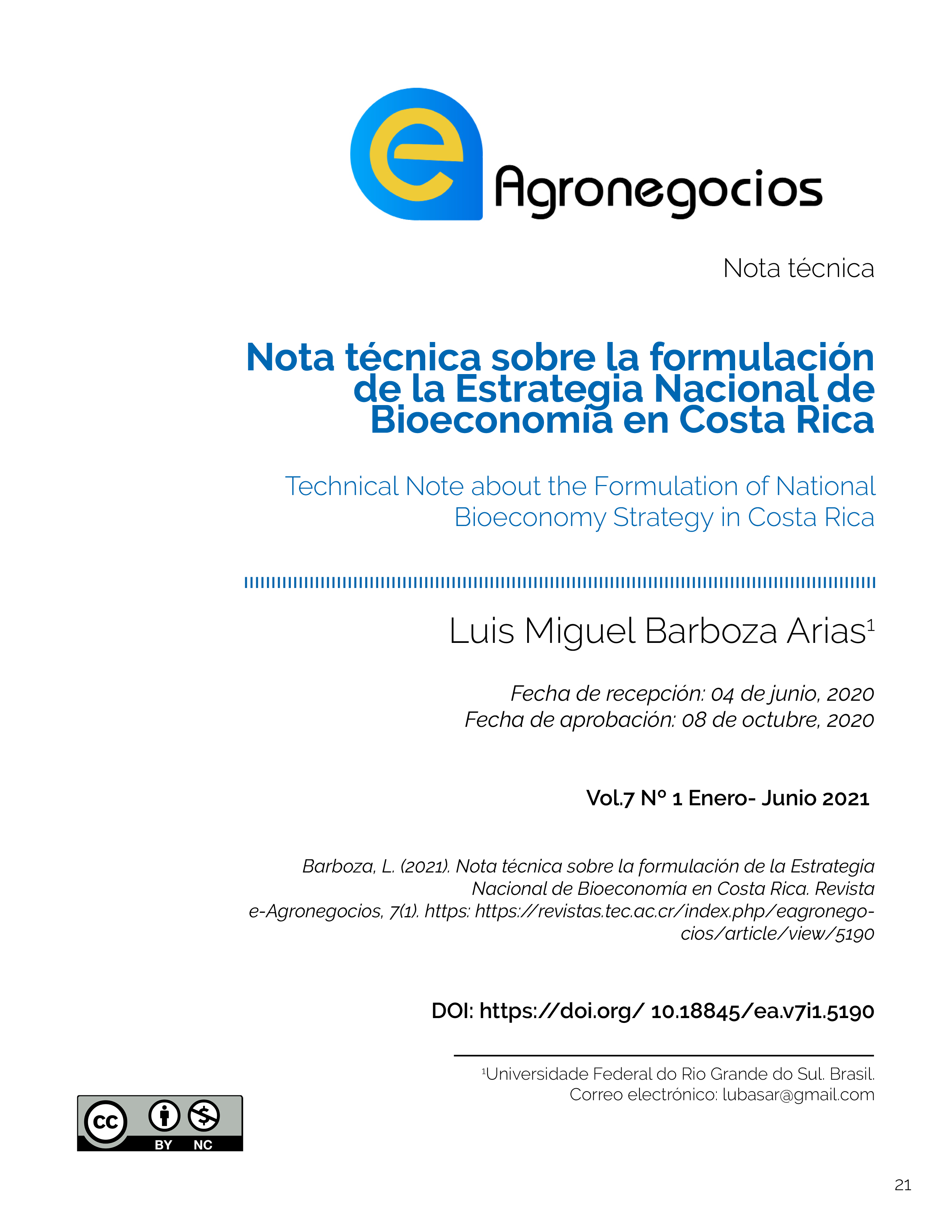Technical Note about the Formulation of National Bioeconomy Strategy in Costa Rica
Main Article Content
Abstract
This article describes the formulation of the National Bioeconomy Strategy (ENB) in Costa Rica. The potential for articulating this approach with Nationally Appropriate Mitigation Actions (NAMAs) is discussed, in order to consider the significance of this integration to the long-term development policy. We utilize the documental review to recuperate and describe information about the public policy of bioconomy in Costa Rica. It is concluded that the ENB can make significant contributions to the sustainable transition goals. Nevertheless, it is important to provide an operative framework for the creation of strategic niches of bioeconomy, according to local schemas of schemes of governance and capacity-building approach.
Article Details

This work is licensed under a Creative Commons Attribution-NonCommercial 4.0 International License.
Las personas autoras conservan los derechos de autor/a y ceden a la revista el derecho de la primera publicación y que pueda editarlo, reproducirlo, distribuirlo, exhibirlo y comunicarlo en el país y en el extranjero mediante medios impresos y electrónicos. Asimismo, las personas autoras asumen el compromiso sobre cualquier litigio o reclamación relacionada con derechos de propiedad intelectual, exonerando de responsabilidad a la Editorial Tecnológica de Costa Rica. Además, se establece que los autores pueden realizar otros acuerdos contractuales independientes y adicionales para la distribución no exclusiva de la versión del artículo publicado en esta revista (p. ej., incluirlo en un repositorio institucional o publicarlo en un libro) siempre que indiquen claramente que el trabajo se publicó por primera vez en esta revista.
References
Aramendis, R. H., Rodríguez, A. G., & Krieger Merico, L. F. (2018). Contribuciones a un gran impulso ambiental en América Latina y el Caribe: bioeconomía. Chile: CEPAL.
Abramovay, R. (2018) A Amazônia precisa de uma economia do conhecimento da natureza. Programa de Pós Graduação em Ciência Ambiental Universidade de São Paulo, São Paulo.
Comité Interministerial de Bioeconomía. (2019). Estrategia Nacional de Bioeconomía. Presentación de Power Point. MICITT.
European Commission. Directorate-General for Research and Innovation. (2012). Innovating for sustainable growth: A bioeconomy for Europe. Publications Office of the European Union.
Fischer, L.B., y Newig, J. (2016). Importance of actors and agency in sustainability transitions: a systematic exploration of the literature. Sustainability, 8(5): 476. https://doi.org/10.3390/su8050476
Geels, F.W. (2002). Technological transitions as evolutionary reconfiguration processes: a multi-level perspective and a case-study. Research policy, 31(8-9). 1257-1274. https://doi.org/10.1016/S0048-7333(02)00062-8
Geels, F.W. (2004). From sectoral systems of innovation to socio-technical systems: Insights about dynamics and change from sociology and institutional theory. Research policy, 33(6-7): 897-920. https://doi.org/10.1016/j.respol.2004.01.015
Geels, F.W. (2019). Socio-technical transitions to sustainability: a review of criticisms and elaborations of the Multi-Level Perspective. Current Opinion in Environmental Sustainability, 39: 187–201. https://doi.org/10.1016/j.cosust.2019.06.009
Gomez San Juan, M., Bogdanski, A. y Dubois, O. (2019). Towards sustainable bioeconomy - Lessons learned from case studies. Rome: FAO.
Grin, J. (2010). The governance of transitions. Transitions to Sustainable Development: New Directions in the Study of Long Term Transformative Change. En: Grin, J., Rotmans, J., y Schot, J. (Eds): Transitions to Sustainable Development. London: Routledge.
ICAFE. (2019). Informe trimestral del Proyecto de Apoyo a la NAMA Café 2019. Costa Rica: ICAFE.
INEC (2015). Instituto Nacional de Estadística y Censos. VI Censo Nacional Agropecuario 2014: Resultados generales. San José, Costa Rica: Instituto Nacional de Estadística y Censos.
Kern, F., y Rogge, K.S. (2018). Harnessing theories of the policy process for analysing the politics of sustainability transitions: A critical survey. Environmental innovation and societal transitions, 27: 102-117. https://doi.org/10.1016/j.eist.2017.11.001
Köhler, J., Geels, F.W., Kern, F., Markard, J., Onsongo, E., Wieczorek, A., y Fünfschilling, L. (2019). An agenda for sustainability transitions research: State of the art and future directions. Environmental Innovation and Societal Transitions, 31, 1-32. https://doi.org/10.1016/j.eist.2019.01.004
MICITT. (2019). Indicadores Nacionales de Ciencia, Tecnología e Innovación. Costa Rica: MICITT.
MINAE. (2019). Costa Rica. II Informe bienal de actualización ante la Convención Marco de las Naciones Unidas sobre el Cambio Climático. Costa Rica: MINAE.
OECD (2009). The Bioeconomy to 2030: Designing a Policy Agenda. OECD Publishing, Paris. https://doi.org/10.1787/9789264056886-en
Rodríguez, A. G., Rodrigues, M. D. S., & Sotomayor Echenique, O. (2019). Hacia una bioeconomía sostenible en América Latina y el Caribe: elementos para una visión regional. Chile: CEPAL.
Rodríguez-Vargas, A. G. (2019). Bioeconomía en Costa Rica. La bioeconomía. Nuevo marco para el crecimiento sostenible en América Latina, 103.
Turnheim, B., Berkhout, F., Geels, F., Hof, A., McMeekin, A., Nykvist, B., y van Vuuren, D. (2015). Evaluating sustainability transitions pathways: Bridging analytical approaches to address governance challenges. Global Environmental Change, 35: 239-253. https://doi.org/10.1016/j.gloenvcha.2015.08.010

